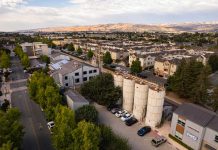At Live Oak High School, the Future Farmers of America program
staggers to keep running. The school budget cuts that have hit the
school and administration threaten the program significantly by
proposing to cut out many of the regional occupation preparation
courses that teach many agricultural skills to students.
At Live Oak High School, the Future Farmers of America program staggers to keep running. The school budget cuts that have hit the school and administration threaten the program significantly by proposing to cut out many of the regional occupation preparation courses that teach many agricultural skills to students. Included in this course list are veterinary science, horticultural business, floral design, agriculture sales and service and agricultural mechanics. Often the administrative attitude given to the ROP courses is, “Why save these electives when we need to teach the solid courses?” One might ask the same question, but there actually are many benefits to taking an agricultural class for students looking for success in college, career training and life in general.
To understand what is at stake, I must begin with a general overview of the program. The FFA program has been promoting and teaching leadership skill to high school students for decades. The program provides the required-to-graduate courses in life and physical sciences, and in ag biology and ag geology. These classes provide the same important college credit, but include an agriculturally related project at the end of the year instead of the standard research-based ones. These Supervised Agricultural Experience Projects are conducted on a student’s free time off campus and can range from raising a market animal for the Santa Clara County Fair to work experience projects in a student’s given occupation. In addition, several conferences and competitions arise during the school year that allow students to embrace and strengthen their leadership skills. This combination of classes and student activity work truly does make a difference in the education of students by handing them an opportunity to find the responsible leader within themselves.
During the junior and senior years of agricultural education experience, students have the option of taking the ROP courses in the previously mentioned fields of agriculture. A student interested in the veterinary field, for example, can take a pre-college level course and hone in on their interest. Whether the students actually pursue that field or not, the ROP courses set the path for career selection and life experience that will help students throughout life.
So what’s the problem with our program? Morgan Hill FFA is threatened by the possibility of the ROP courses being cut from lack of administrative and school counselors support and funding. By eliminating these agricultural courses, the FFA program is effectively cut in half, as freshman and sophomore students will take ag biology, then geology and afterward have no further ag instruction. Membership in the FFA and participation in the program consequently expires with that cut.
The facts are straight; administrators, school counselors and our principal do not promote the ag science or the ROP courses, and so the voice for our program never gets out unless we take it upon ourselves to do so. We need everyone’s help and support to save this program.
Students can help today by signing up for an agriculture class to help save our proud Morgan Hill FFA Chapter.
Laura Lewandowski, Morgan Hill FFA Reporter
For more information on the FFA, go to ffa.org or call (408) 201-6100.







